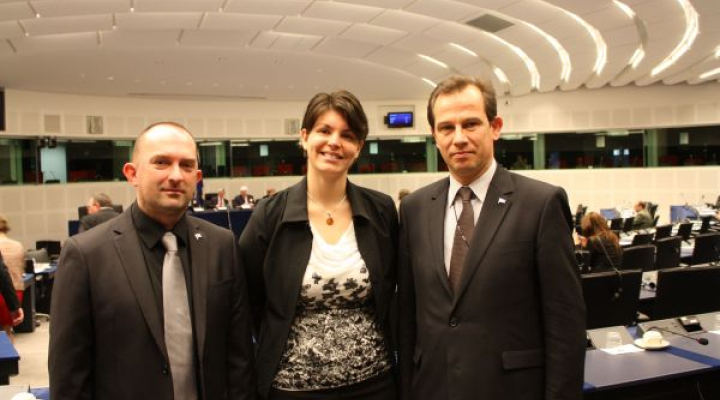Breton Publishing House’s Books on Transylvania in Strasbourg
Following the invitation of Csaba Sógor, MEP on
behalf of RMDSZ, its owner himself, the historian Laurent
Planchais-Lagatu, presented the publishing house.
Professor Cristoph
Pan, retired director of the South Tyrolean Institute for Ethnic Groups
presented the history of the prestigious institute from Bolzano.
Beginning from 1962, its collaborators carried out around 250 studies
related to the minorities from 30 countries. The professor also talked
about the fact that during the course of its existence, due to various
government changes the institute was confronted with many challenges,
but despite the changing economic, social and political conditions (for
example the Austrian-Italian conflict within the UN, the fall of the
Berlin Wall), it succeeded to consistently and objectively present the
situation of minorities. Since 1994 the institute has had a consultative
role beside the EP’s Intergroup for minorities. Beata Sybille Pfeil,
the current director of the institute, presented its publications,
emphasizing those published together with the Council of Europe. MEP
Herbert Dorfmann talked about the foreseeable political and economic
future of its community.
Laurent Planchais-Lagatu, owner of the Éditions Armeline publishing house from Brittany, presented its activity, insisting on the collection Peuples en péril (Endangered People). The historian recounted that his house publishes exclusively books on the histories and cultures of autochthonous national minorities from Europe, as he himself is a „supporter of Europe and of minorities”. Éditions Armeline is already known to the Hungarian readers from Transylvania, through the books of professor Bernard Le Calloc’h: Les Sabbataires de Transylvanie / The Sabbatarians from Transylvania, Les Csángós de Transylvanie / The Csangos from Transylvania and Les Sicules de Transylvanie / The Szeklers from Transylvania.
Csaba Sógor thanked his guest
for accepting his invitation: “It was a huge pleasure to see in the
catalogue of a foreign publishing house several books on Transylvania
written by people of other nationalities than Hungarian. The Hungarians
from Transylvania need such a professional and effective support,
because this way we can make more easily understandable our problems
arising from our minority conditions. The fact that the Hungarian
community from Transylvania also figures in the plans of the publishing
house, confirmed to me that we are not alone.”
Out of the books of
Éditions Armeline related to the history of Hungarians Csaba Sógor will
offer collections to several libraries and universities from
Transylvania.











